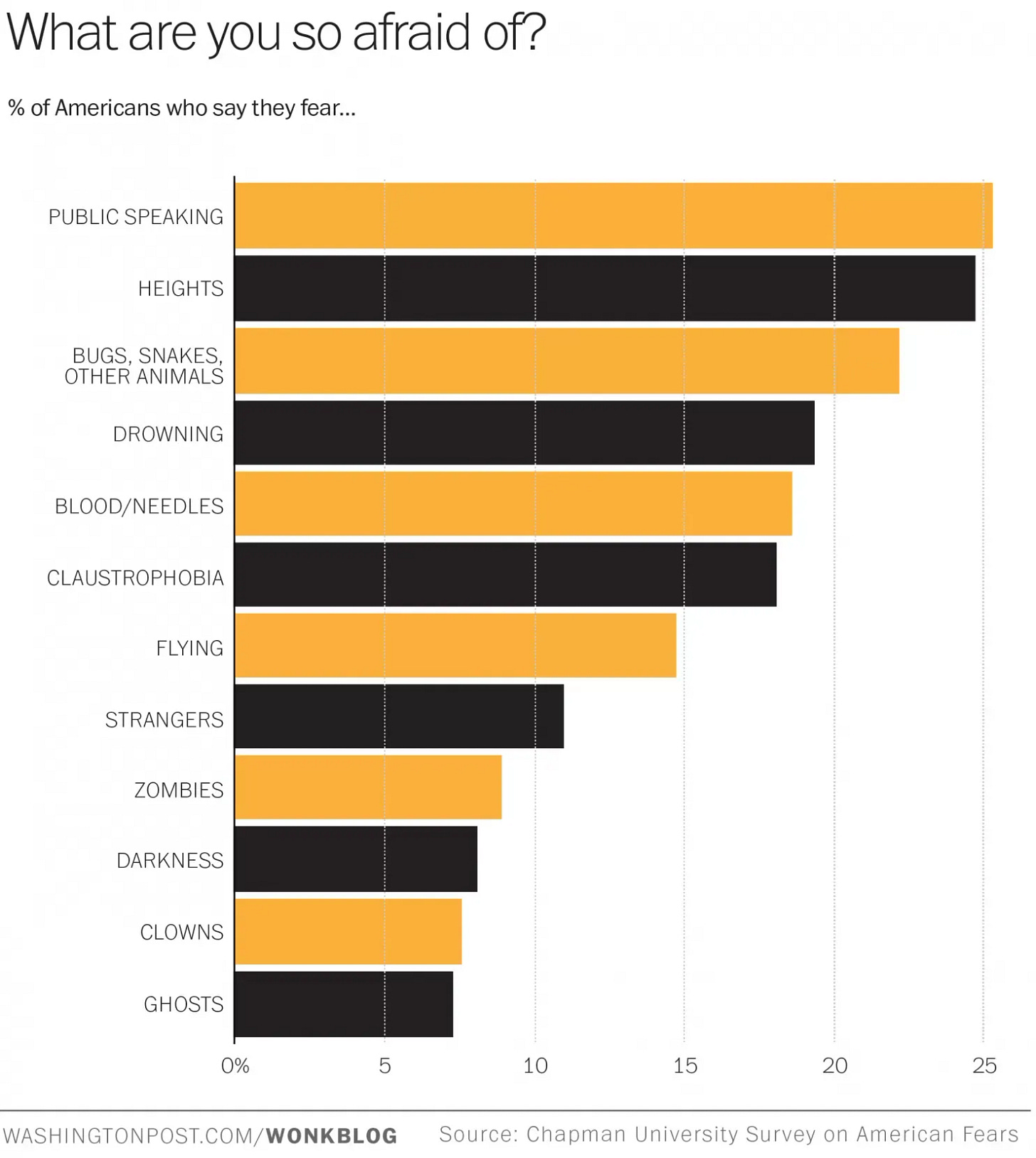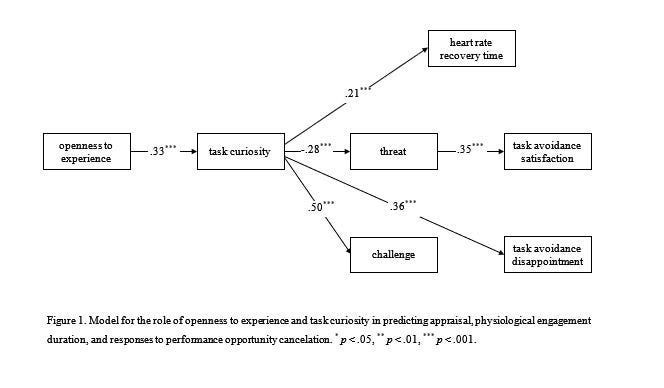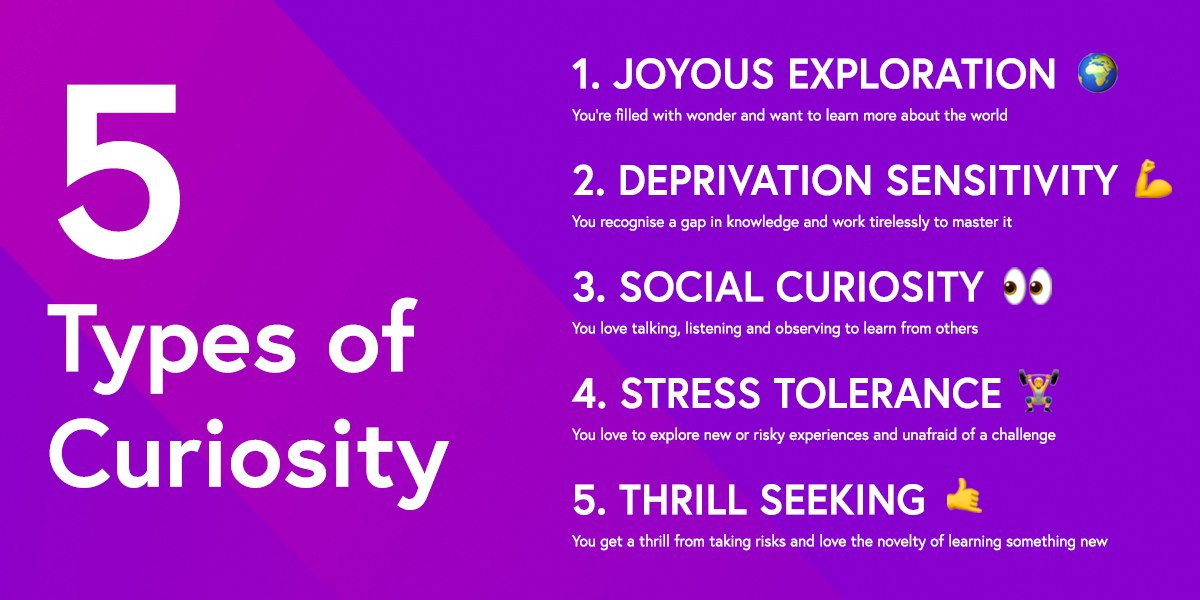New Research on How Being Curious Enhances Public Speaking Skills
How Psychological Strengths Reduce Fear...For a Cost
The Power of Curiosity is Still Underestimated
In today's information age, curiosity is king. Think about websites with headlines tweaked to siphon your attention ("Not-So-Popular" Vacation Spots That Deserve WAY More Attention or 50 Disturbing Messages Real People Have Received In Letters And Texts). Do you plan on reading these articles? If so, this is the power of curiosity to trigger and hold attention.
Perhaps the best way to spark curiosity is through trial and error, much like what internet content creators do. Although there is no magic formula for inducing curiosity, we believe our new experimental research offers insights for how the mind makes meaning out of events - and learns.
In my first book Curious? and the dozens of scientific studies since, my colleagues and I discovered how curious individuals outperform in various life domains, including education (Kashdan & Yuen, 2007), work (Kashdan, Goodman, et al., 2020), and social relationships (Kashdan, DeWall, et al., 2013; Kashdan, McKnight et al., 2011; Kashdan, Sherman, et al., 2013). It seems that curious folks are more likely to see new, uncertain situations as opportunities to grow rather than scary obstacles to avoid. But there's a catch - when curiosity is unsatisfied, it can produce feelings of dissatisfaction and disappointment.
Curiosity is more complicated than presumed. It can lead to enhanced performance but also discomfort. We wanted to know why.
Only a handful of studies have peeked at the physiological experience of curiosity. For example, what happens to our heart rate in the throes of being curious? Plus, no researcher has explored how curious people react when forced to abruptly exit a new situation that they've prepared for.
The Stress Induction Experiment
We had a hypothesis. We thought that if you're highly curious, or open to trying new things, you might show stronger signs of engagement: a quicker heartbeat, when faced with potential stress. We also thought highly curious people might be less inclined to view tasks as painful threats.
“If you are immune to boredom, there is literally nothing you cannot accomplish. It is the key to modern life.” – David Foster Wallace
And we thought highly curious people might feel frustrated upon experiencing the anticipation, the adrenaline, of unfinished business.
The neighbor who turns a blind eye while their dog leaves a mess on your lawn. You rehearsed the main points, ready to gently request respect for your shared space. Yet, they are never home and the confrontation never occurs, and you find yourself oddly uncomfortable.
The family dinner, where a great uncle insists on airing his racist views. You gear up to counter with facts and poise, prepared for a generation clash of words. But the opportunity slips by, and you regret the lost opportunity for moral courage.
To test these ideas, we amped up the pressure. Participants were told to prepare a 2-minute speech on "Why are you a good friend?" with an audience waiting. They knew there was a 50% chance they'd have to deliver it. After a tense minute of preparation, we threw a curveball: they were told they wouldn't be giving the speech after all. Their efforts were seemingly in vain.
What did we discover?
Adults who were more open to experiences (personality trait) felt more curious (momentary state) about the public speaking performance. For them, it wasn't just a speech; it was a thrilling challenge, a test of their mettle. Their hearts raced faster and longer as they geared up for the possibility of speaking. But when we pulled the rug from under them, saying they wouldn't deliver the speech, their curiosity turned into a pang of disappointment. On the flip side, those who saw the task as a looming threat to their ego sighed with relief. They felt a wave of satisfaction wash over them, escaping the ordeal, a hallmark of those less inclined to curiosity.
Are you a visual learner? If so, this means horseshit since studies show that matching teaching methods to self-identified learning styles is a myth.
Fun fact: a clear image can enhance everyone’s understanding. Check out our curiosity findings:
Take a look at the two most impactful findings in the Figure above. Those with high levels of curiosity view public speaking - society's most feared situation - as an opportunity to discover and test their strengths
.50 correlation with viewing hard tasks as a challenge!
-.28 correlation with viewing hard tasks as a threat!

Having studied curiosity extensively, I can tell you that it's rare to find such a clear-cut result. It seems that curious individuals relish growth opportunities, even when painful. Also, our model emphasizes the importance of distinguishing between the different dimensions of curiosity (here). Interestingly, one particular dimension - Deprivation Sensitivity - tends to lead to dissatisfaction and disappointment when there is a gap between what exists and what is desired. We can refer to the pain felt as residual, unsatisfied knowledge seeking.
Our work allows for a better understanding of how curiosity operates in performance situations, especially when an opportunity for novel experiences is anticipated, prepared for, but then withdrawn.
Do know you are the first people on earth besides our team to learn about these findings. So tell us what lessons you can draw from this work - for yourself and people you lead. If you want to cite our research, use this reference:
Kaczmarek, L.D., Enko, J., Behnke, M., & Kashdan, T.B. (in press). How curiosity enhances performance: Exploring the mechanisms of physiological engagement, challenge and threat appraisal, and novelty deprivation. Journal of Happiness Studies
Provocations
Have you experienced a situation where your curiosity was piqued, but then denied the opportunity to explore further? Such as being ghosted after a great online conversation or romantic date. Or taking an interest in a job after an incredible interview that never panned out into an offer. How can you use curiosity to bring closure to this loss + feel motivated to keep going toward desired goals?
Thought Experiment: Imagine you're preparing for a significant presentation at work, but just before you begin, you realize the technology has failed, leaving you without your slides. How might your curiosity transform this unexpected situation into an opportunity to engage your audience in a new, interactive way? Notably, this happened to me a huge business event in Moscow, Russia. It ended with one of the greatest public speaking moments in my career. Why?
My expectations dropped and I no longer worried.
The audience did the same and thought my extemporaneous talk was heroic. I had no notes and talked for 60 minutes to an audience that didn’t understand English and required a simultaneous translator.

Extra Curiosities
If you’re like me, I love collecting exceptional teaching/workshop exercises. I found a slew of new ones that I plan to tweak in the extremely timely book, The Power of Friendship. Always a timely topic, this is a wonderful, short treatise on what we know about friendship and how to obliterate loneliness. Order it for less than $7 on Amazon - click here.
Don’t forget - the next premium member Ask Me Anything call is on September 20 1pm EST.
Dr. Todd B. Kashdan is an author of several books including The Upside of Your Dark Side (Penguin) and The Art of Insubordination: How to Dissent and Defy Effectively (Avery/Penguin) and Professor of Psychology and Leader of The Well-Being Laboratory at George Mason University.
Read Past Issues Here Including:
Authenticity Illusions: When Trying to Be Real Reveals the Deep Fake
"Sometimes he was up half the night, using tweezers to paste sesame seeds onto hamburger buns or mixing and coloring the salty dough that looked more like ice cream in pictures than real ice cream did." - Jennifer Egan Welcome to the wild, wild west of the well-being at work movement -






Hi Todd
Thanks for a fab read and well done on the insanely significant stats. Always satisfying (I know it shouldn’t be) to hit the bullseye.
Provocations: once on the way to an overseas offsite my laptop was stolen in the airport - pre-cloud, no back up disk in another bag. Just taught me how much I don’t need slides (nor do the audience!) A good lesson though for some reason I still do slides.
I’m not so familiar with curiosity research. Are well as stable psychometrics for you five subtype models is there any evidence for similar stable neurological differentiation?